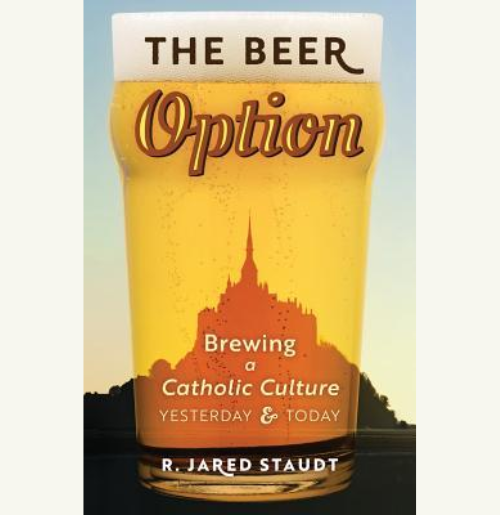R. Jared Staudt,
The Beer Option: Brewing a Catholic Culture Yesterday and Today
(Angelico Press, 2018
).
My wife Lacy and I own Saints Row Brewing in Gaithersburg,
Maryland. As Catholic owners of our family’s brewery/taproom, we were eager to
dive into Jared Staudt’s The Beer
Option: Brewing a Catholic Culture Yesterday and Today. Having been in the industry for more than a
decade, I was aware of the Catholic brewing tradition, even if only vaguely, so
I was excited to have this opportunity to explore more fully the roots of my
work, and to see our enterprise in continuity with a rich, centuries-old
tradition. Our formation and faith informs every aspect of our work, and that
has given us a unique opportunity within the industry, which has widely lost
and forgotten its roots.
What surprised me the
most in going through The Beer
Option was the depth of
reflection the last three sections stirred in me. Of all of these, Part Two,
“Beer and Culture,” was the section that most spoke to me. As a Catholic
brewer, I have a unique way of viewing and understanding everything that goes
into the brewing process. We see the good in all that has been provided to us
and recognize those things as gifts from our Creator. To see hops, wheat
barley— the “fruits of the earth”—as gifts and then to produce something new
with them is a kind of participation in the creative work of God. It is a
deeply connecting exercise. The brewer, when he stops and reflects on his
craft, cannot help but feel a connection and glimpse of God’s love and affection
for us. God created every grain that goes into the mysterious and wonderful
process that yields an even greater gift, a delicious and convivial beverage to
be “enjoyed to praise God.” Even if Benjamin Franklin didn’t quite say it, it’s
nevertheless true that “beer is proof that God loves us and wants us to be
happy.”
The brewer has a great opportunity to turn his work into a kind of worship and praise of our Creator.
To carefully craft
recipes with an eye for nuance, subtlety, and utmost quality the brewer
immerses himself in the character of his material. The moisture content of
grains, the specific salt content in his water, counting and calculating the
aging of hops after harvest, and the oil content. We make the connection
between these earthly gifts and their transcendent Giver, and they remind us
that in all things our eyes should be ever fixed with a “view toward the
eternal.” Recognizing God as the source of all that we work with reminds me
that there is great dignity in all work, even the mundane, especially when done
with a heart of service, love, and thanksgiving. The brewer, then, has a great
opportunity to turn his work into a kind of worship and praise of our Creator.
This section also struck
me in how closely it reflects the mindset my wife and I have when it comes to
what we want our work to accomplish. We’ve been fortunate enough to allow our
passion for brewing to become a means of providing for our family. But we’ve
always felt that that was not the sole purpose of this enterprise. We recognize
the need for Catholic culture in our world, and very strongly believe that our
place as Catholic brewery owners puts us in a unique position to influence our
community and be in our industry a beacon of hope inspired by our faith.
The positive cultural
influence our brewery might have has to radiate from the culture of our home. Saints
Row Brewing affords us the opportunity to make the choices we feel are best for
our family. I work and run the brewery with assistance from my wife. But Lacy
is home, schools our children, cares for our home, and helps keep an objective
eye on my more lofty and aspirational ideas. For a business owner there is a
temptation to work harder, longer hours and earn more. It would certainly be
possible for us to earn above our needs, but this would undermine our family
life. Home and work should benefit each other. In a Catholic vision they do.
That’s why we’ve deliberately set ourselves up to do the work that is needed to
provide for ourselves and our employees and to resist the “more, more”
temptation. Our days and hours are scheduled to ensure that I can be home and
be completely present to my family.
We firmly believe that
our faith and worldview should also impact the way we treat and view our staff.
Our staff is very much a part of the Saints Row family, as Lacy and I are. We
pay our staff a just and generous wage for their work, understanding the great
value and dignity of their time, and how much it means to Lacy and me, as it
gives us the chance to accomplish our goals at home as well. In the last five
years that we have been open, we’ve seen our staff come to appreciate the
mission and vision we have for our brewery. They have embraced this and
understand that when someone walks through our doors, they are more than just a
customer. Our patrons are guests to be cared for and valued.
Lastly, we hope that our
guests experience a different culture when they walk through our door. We hope
that they come to feel and know that they are not just another paying customer
in our eyes, but a beloved neighbor whom we care about and are excited to see
again. This represents the kind of cultural shift we are attempting to inspire
in the industry, a very different way of what Jared Staudt calls “Experiencing
Beer.”
Martin Prebula and his wife Lacy are the owners of Saints Row Brewing in Gaithersburg, Maryland.



